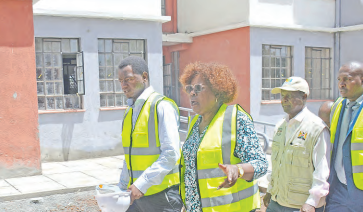

Contributing to the government’s Housing Levy Fund does not guarantee one a house, Cabinet Secretary Alice Wahome has said, throwing taxpayers off balance.
This comes as the CS moves to clarify that the deductions are a tax and not a levy or saving as initially indicated by Housing and Urban Development PS Charles Hinga.
On March 23, 2023, PS Hinga said the housing fund contribution was not a tax but a saving and conferred to a direct right to either get an affordable unit, or a refund with interest after seven years where one is not interested in a house.
The levy is a 1.5 per cent deduction from an employee’s gross salary with a matching contribution from their employer, making it three per cent.
For instance someone earning Sh100,000 is paying Sh1,500 per month with the employer matching the same, which makes it Sh3,000. This amounts to Sh36,000 annually.
CS Wahome however on Wednesday said the deduction is a tax, meaning there are chances of no refunds with no guarantee to own a home under the government programme, where it is collecting at least Sh65 billion annually from taxpayers to drive the affordable housing programme.
The kitty is being managed by the Affordable Housing Board, which receives applications, accesses them and allocates houses through the Boma Yangu platform.
“What you are contributing is not your savings, you are contributing a tax…a levy is a tax the way you do road levy, it not to own a road or a house. You contribute to the pool to build houses for Kenyans to access,” Wahome said during an interview with a local station.
She said the platform is open to all Kenyans with hosues being allocated with transparency. Once allocated, beneficiaries will the be required to pay a deposit, depending on the size of unit one wants, then go ahead to pay monthly instalments on a rent-to-own basis.
For instance a studio apartment costing Sh640,000 requires a deposit of Sh64,000, with a monthly payment rent (rent to own) of Sh3,900.
A one-bedroom unit under the social housing segment has a monthly repayment ask of Sh5,350 after a 10 per cent deposit on the Sh960,000 total amount.
The affordable housing units have been placed under three categories–social housing, affordable housing units and affordable middle-class housing units which fetch higher prices, with buyers allowed for one-off payment if one has the whole amount.
“Once applied, the board accesses the applicant before being allocated a house, which they then pay a deposit and go ahead to rent-to-own. The moment you register you can start saving because your money will be transferred to your account when you get the house. Assuming you don’t get the house, or along the way you decide I need my money for different things, we will refund the money from the fund,” CS Whome said.
The rent-to-own plan has a 30- year window. At least 550,000 Kenyans have indicated intentions to secure units under the programme, the CS said, with handing over of the first batch expected later next month.
The government plans to avail 4,888 units for uptake, part of the 840,622 units that are being developed in different parts of the country.
According to the ministry, the houses will be allocated on a ‘first come first serve’ basis, with those that have applied through the Boma Yangu portal and selected the preferred houses being prioritised.
To enhance the programme, the government has identified pieces of land floated to developers for interest in joint development under Public-Private Partnerships.
Of the initial batch, 1,080 units are at the Mukuru project which is the biggest single housing project being developed by the government comprising 13,248 housing units made up of bedsitters (26 blocks of 5,616 units), 14 blocks of one-bedrooms with 3, 024 units and 48 blocks of two-bedroomed units, totalling 4,608.











